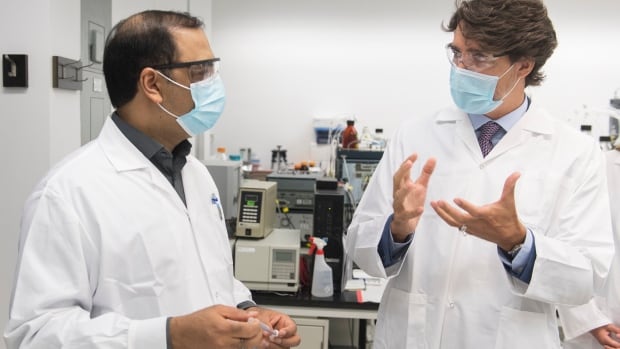The federal Liberal government’s COVID-19 vaccine manufacturing policy is facing yet another challenge after Maryland-based Novavax announced late Tuesday it may not have enough cash in a year’s time to stay in business.
That means three pillars of the government’s made-in-Canada COVID-19 vaccine procurement strategy have failed or could soon fail.
In addition to this new hiccup with cash-strapped Novavax, there was the doomed deal with China-based CanSino and a major investment in the now-defunct Medicago.
The government did, however, successfully procure tens of millions of COVID-19 doses from foreign companies like Pfizer and Moderna, firms that supplied highly effective shots that have saved an untold number of Canadians from severe outcomes and death.
The government has long promised it will produce Novavax’s COVID-19 vaccine at the National Research Council (NRC) Royalmount site in Montreal — a publicly owned facility in a country that has seen vaccine production all but disappear after decades of mismanagement and changing economics.
Prime Minister Justin Trudeau said in 2020, at the height of the pandemic, that the country would produce Canadian-made shots at a new purpose-built facility at Royalmount by the end of that year. That never happened after a plan to work with CanSino fell through.
Then, in early 2021, Trudeau announced the partnership with Novavax, saying the NRC’s biologics manufacturing centre would churn out the U.S. company’s COVID-19 shot by “mid-2021.” The plan was billed as a way to lessen Canada’s dependence on foreign sources of shots.
As CBC News has previously reported, the NRC plant still hasn’t produced a single vial of the Novavax vaccine.
While the biologics centre is built and Health Canada has authorized the Novavax shot for use in Canada, the NRC site still isn’t producing vaccines at scale — the complex regulatory and scientific process hasn’t been completed on the government’s ambitious timeline.
WATCH: Canada still without vaccine plant despite federal promises
One year after it was supposed to begin producing vaccines for Canada, the government-funded Montreal factory sits idle and continues to face regulation hurdles.
Novavax’s warning Tuesday that it has “substantial doubt” about its ability to stay in business after the next year could derail the federal government’s plan entirely.
“While our current cash flow forecast for the one-year going concern, look-forward period estimates that we have sufficient capital available to fund operations, this forecast is subject to significant uncertainty, including as it relates to 2023 revenue, funding from the U.S. government, and pending arbitration,” Novavax said in a statement while releasing its fourth-quarter results.
“Given these uncertainties, substantial doubt exists regarding our ability to continue as a going concern through one year from the date that these financial statements are issued,” the company said.

In an interview with Reuters after announcing the financial results, the company’s CEO said the company has been spending at a “hot rate,” and it plans to cut back — including possible job cuts.
CBC News asked Novavax if it plans to continue its work with the NRC given the state of the company’s finances. Novavax hasn’t responded.
A spokesperson for Industry Minister François-Philippe Champagne said the government “will continue to monitor the situation regarding Novavax” and suggested the NRC site could be used to manufacture other vaccines from different companies.
“Built ahead of schedule, the Biologics Manufacturing Centre is capable of commercial, end-to-end production of cell-based vaccines — for whatever the future may hold,” Laurie Bouchard said in a statement to CBC News.
“The centre can host multiple partners, support a range of biomanufacturing activities, and is capable of producing up to 2 million doses per month, depending on the vaccine candidate,” she said.

Christine Jodoin, the vice-president of strategic initiatives at the NRC, said the federal research body will “continue to work with Novavax Inc., on the production of the company’s COVID-19 vaccine, Nuvaxovid.”
Jodoin said there may be other partners — and other products — for the site in the future.
The government-owned manufacturing facility “can pivot to produce cell-based vaccines or other drugs to keep Canadians safe.”
The Novavax development follows news last month that Quebec-based Medicago, another COVID-19 vaccine manufacturer, will close down.
Once billed as a Canadian success story, Medicago’s parent company said it didn’t see a future for the Quebec firm despite significant taxpayer funding.
The federal government gave Medicago nearly $200 million to build a plant in Quebec City to manufacture COVID-19 shots.
The government also signed an advance purchase agreement with the company to procure tens of millions of doses.
Bouchard defended the government’s record on the vaccine file.
“At the beginning of the pandemic, our government acted quickly to ensure Canadians had access to the most promising COVID vaccines as early as possible,” Bouchard said.
“Because of our quick and decisive actions, we were able to ensure Canada had enough vaccines for every Canadian and we were able to scale up domestic biomanufacturing capacity after 40 years in decline,” she said.


